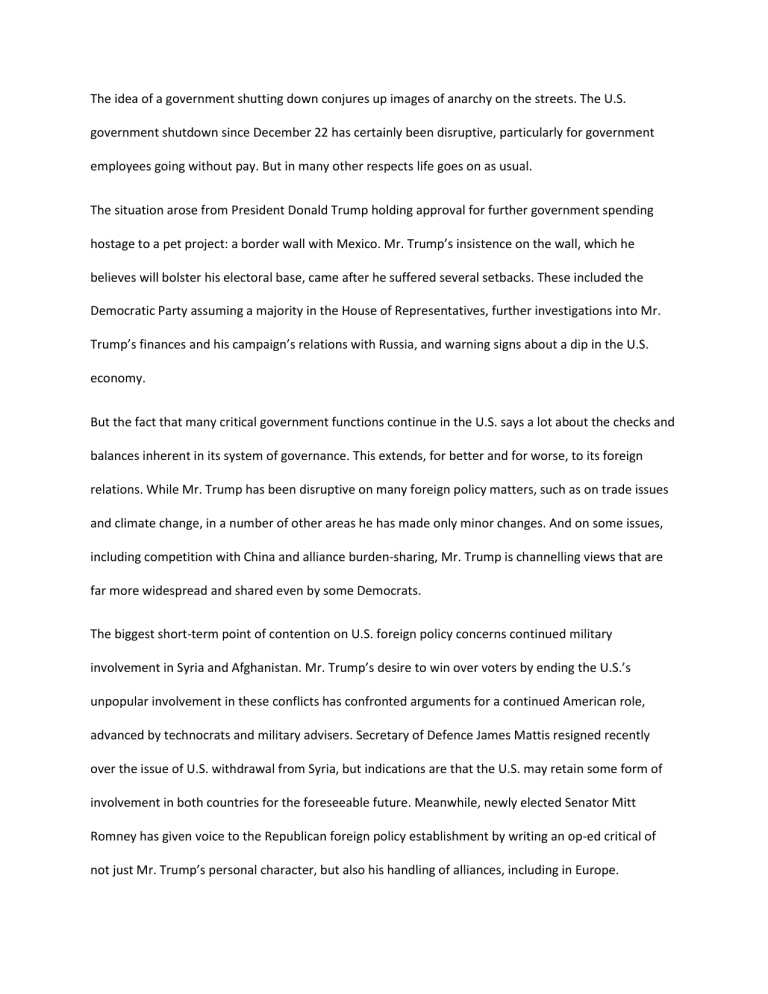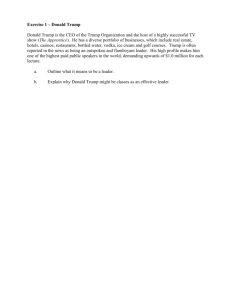xscri
advertisement

The idea of a government shutting down conjures up images of anarchy on the streets. The U.S. government shutdown since December 22 has certainly been disruptive, particularly for government employees going without pay. But in many other respects life goes on as usual. The situation arose from President Donald Trump holding approval for further government spending hostage to a pet project: a border wall with Mexico. Mr. Trump’s insistence on the wall, which he believes will bolster his electoral base, came after he suffered several setbacks. These included the Democratic Party assuming a majority in the House of Representatives, further investigations into Mr. Trump’s finances and his campaign’s relations with Russia, and warning signs about a dip in the U.S. economy. But the fact that many critical government functions continue in the U.S. says a lot about the checks and balances inherent in its system of governance. This extends, for better and for worse, to its foreign relations. While Mr. Trump has been disruptive on many foreign policy matters, such as on trade issues and climate change, in a number of other areas he has made only minor changes. And on some issues, including competition with China and alliance burden-sharing, Mr. Trump is channelling views that are far more widespread and shared even by some Democrats. The biggest short-term point of contention on U.S. foreign policy concerns continued military involvement in Syria and Afghanistan. Mr. Trump’s desire to win over voters by ending the U.S.’s unpopular involvement in these conflicts has confronted arguments for a continued American role, advanced by technocrats and military advisers. Secretary of Defence James Mattis resigned recently over the issue of U.S. withdrawal from Syria, but indications are that the U.S. may retain some form of involvement in both countries for the foreseeable future. Meanwhile, newly elected Senator Mitt Romney has given voice to the Republican foreign policy establishment by writing an op-ed critical of not just Mr. Trump’s personal character, but also his handling of alliances, including in Europe. Despite an overwhelmingly corrosive political environment, curious strains of consensus are emerging. For example, a figure like Elizabeth Warren, a likely candidate for President representing the left wing of the Democratic Party, has become vocally critical of Chinese lobbying efforts. This is indicative of the growing bipartisan concern about the emerging U.S. competition with China. The U.S. thus presents a paradox. Partisan and intra-party fissures are likely to intensify in both Republican and Democratic circles. The federal government is in complete disarray. And yet, the new year begins with the U.S., in many ways, running on autopilot. The writer is Fellow, Foreign Policy, Brookings Institution The nuns were transferred last year, but resolved to stay back at the convent to ensure justice to the victim who accused Bishop Franco Mulakkal of raping her several times. Nearly a week after the State government appointed a special prosecutor in the nun rape case, four of the five nuns who had protested against Bishop Franco Mulakkal, the accused, have once again been asked to leave the convent here. Official sources said Superior General Regina Kadamthottu of the Missionaries of Jesus congregation, in letters addressing each of nuns, seeks to enforce the transfer orders issued to the nuns last year. While sister Anupama Kelamangalathuveliyil has been directed to join the Chamiyari community in Punjab as per an earlier order in March 2018, Sister Ancitta Urumbil has been asked to join the Pariyaram community, Kannur. Sister Alphy Pallasseril has been asked to join the Pakartala community in Bihar, and Josephine Villoonnickal was appointed as Superior at Lalmatia community in Jharkhand in May 2017 Sister Nina Rose, who was also part of the protest, has not been issued any such directions. Earlier this month, these five nuns of the Missionaries of Jesus congregation, who had staged a protest against the Bishop in Kochi, came out in public once again alleging a deliberate attempt to delay justice to the victim. Confirming the receipt of transfer order, the sisters accused the church of “taking vengeance for their public protests” and said they have resolved to stay back at the convent here to ensure justice to the victim. But the fact that many critical government functions continue in the U.S. says a lot about the checks and balances inherent in its system of governance. This extends, for better and for worse, to its foreign relations. While Mr. Trump has been disruptive on many foreign policy matters, such as on trade issues and climate change, in a number of other areas he has made only minor changes. And on some issues, including competition with China and alliance burden-sharing, Mr. Trump is channelling views that are far more widespread and shared even by some Democrats. The biggest short-term point of contention on U.S. foreign policy concerns continued military involvement in Syria and Afghanistan. Mr. Trump’s desire to win over voters by ending the U.S.’s unpopular involvement in these conflicts has confronted arguments for a continued American role, advanced by technocrats and military advisers. Secretary of Defence James Mattis resigned recently over the issue of U.S. withdrawal from Syria, but indications are that the U.S. may retain some form of involvement in both countries for the foreseeable future. Meanwhile, newly elected Senator Mitt Romney has given voice to the Republican foreign policy establishment by writing an op-ed critical of not just Mr. Trump’s personal character, but also his handling of alliances, including in Europe.



